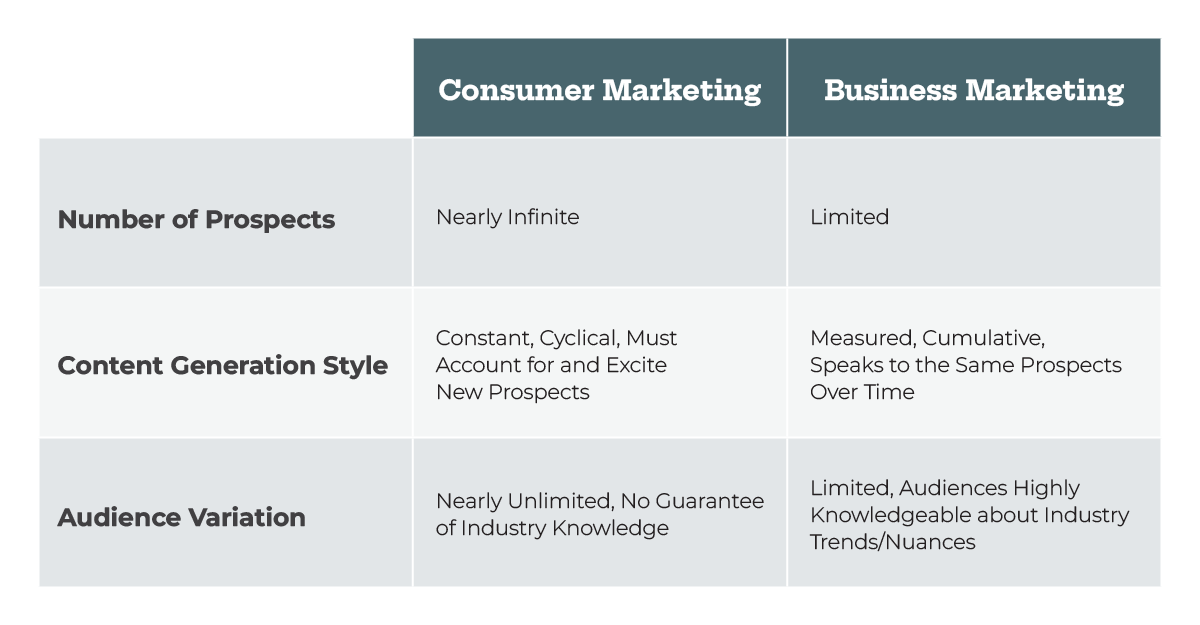Consumer marketing is promotional material (digital, print, or otherwise) directed toward individual private users of a product or service instead of commercial partners. As in other types of marketing, the focus of a consumer marketing strategy will be the expected reaction of members of the audience to the material put in front of them. The difference is that there is typically much more opportunity, and in fact a greater need, in consumer campaigns to harness users’ emotional values and peculiarities for the sake of alignment with a client. There are also unique legal checkpoints in this type of marketing put in place to protect consumers from deceptive advertising.
B2B marketing content tends to keep ROI and advantages over competitors firmly in view at all times, since large-scale business decisions are often removed enough from personal preferences to operate on cold, hard math and almost nothing else. Individual people, on the other hand, may well make an irrational purchase decision if the content they encounter from a given company evokes a negative emotional response, even if the company’s offerings are superior to others in the marketplace.
For this reason, effective consumer marketing requires not just a value proposition, but also a bid for connection. In multi-step, multi-prong campaigns that begin with groundwork like identifying key audience motivators and preferred channels for delivery, the consumer marketing team at CSG® poses a question: you can settle for promotion that lays out ironclad arguments or holds emotional power, but why not both?
Marketing For B2B vs B2C Businesses
Other key differences between B2C and B2B marketing include the pace at which material is generated and the range of variation among the audience. Mapping the customer journey of B2B prospects, for example, usually means dealing with less extraneous information than the same exercise does in B2C campaigns, since business buyers are bound to vary less from one to the next than members of the general public, and their characteristics and values can often be predicted early on.

What are the Benefits of Consumer Marketing?
Similar to marketing in other contexts, consumer marketing provides a host of intertwined benefits that can strengthen a business holistically.
- Awareness
Marketing campaigns raise awareness of a product or service among consumers. This brings new leads into the funnel, and because of the intertwined, self-reinforcing nature of digital communications, the more people who know about a company, the easier it is to bring awareness to others. Successful marketing campaigns can prompt the transmission of a company’s message through social media or influencer channels in such a way that third parties almost become secondary marketers for the company.
- Relationships
Building relationships with prospects constitutes a key benefit of launching a consumer marketing campaign. The essence and definition of consumer marketing lies in its ability to speak a company’s message in the way that appeals most to the people likely to find its offerings helpful. Finding and publicizing the links between consumer lives and business initiatives makes the difference between a business at the margins of communication and one that is known, trusted and liked.
- Product Launches
Each new consumer product calls for a tailored introduction to the public to generate excitement, distinguish the product from similar options and test or solidify the messaging that will be used to promote the product going forward. Making these product introductions falls under the banner of consumer marketing.
- SEO
Particularly through strategies like content marketing, a company can drive traffic to its owned media resources and improve its performance in SEO analytics. With content that establishes authority and thought leadership, meanwhile, the company can compete for valuable keywords that require backlinks from other reputable sources for visibility.
- Conversions
Awareness and traffic are one thing; turning those into sales are another. But marketing structures designed with deep understanding of consumers’ shared characteristics, emotional responses and unique needs and concerns raise the rate at which people make the jump from viewers to participants in a company’s story.
Effective Consumer Marketing Strategies
Effective consumer marketing strategies change case by case. Some business owners may believe they can apply a formula to their marketing that will make their efforts successful with different products, in different corners of the market, and despite audience change over time, but this is mistaken. Sound consumer marketing strategies may not have to be built from the ground up in each instance, but they take into consideration all the variables implied by new products, new markets, new social trends and new technology and means of communication.
Beyond that, successful marketing leverages data mid-stream to guide adaptations and ensure that predictions line up with results. Here are some of the consumer marketing approaches that a firm like CSG might implement for its clients:
- Social Media Influencers
Tapping third parties with access to the consumer pool a company needs to reach can be a decisive strategy in this market. Earned media carries a lot of weight in the public mind, with more than 80% of people regarding reviews as comparable to the recommendations of a friend.
Micro-influencers can help small and mid-size companies take advantage of this phenomenon, since those influencers are typically more available for and more amenable to partnerships than figures with wider reach. Also, because of their smaller followings, micro-influencers tend to have a closer relationship with those people and a greater influence on their purchase decisions. With a number of micro-influencers supporting a company’s marketing efforts, as opposed to one or two macro-influencers, the power of social media can become the engine of awareness, leads and conversions.
- Paid Media
Despite the rise of earned media components like reviews and testimonials in consumer spaces, paid media campaigns have not lost their value in these markets. Traditional ads, when deployed with precision (i.e., along channels that the right consumers frequent, something revealed in market research beforehand) and tipped with a message that cuts to the core of audience motivations, make up an important arm of many consumer marketing efforts.
- Content Marketing
Combining paid media with content marketing, especially digital content, can create a resilient marketing platform, balanced and adaptable to the circumstances of the moment. Because consumers today are surfeited with content during their online activity, they discriminate between wanted and unwanted content with greater speed than ever. This leaves marketers who lean too hard on paid media prongs in a difficult situation: a traditional ad not only has to reach the right audience, but it has to reach them at a moment, ever more rare, when they are not occupied with one or more competing stimuli. This tends to increase the cost-per-acquisition of paid media campaigns and raise their degree of difficulty.
Content marketing supplies a workaround. Businesses can offset the vulnerabilities of other forms of marketing by putting out content that people find valuable or entertaining in itself, rather than for its connection to a product they might find like. This content performs the same function as other promotions (i.e., raising awareness, building trust and authority, improving SEO ranking, inspiring interest in company offerings) but does so on the consumers’ terms, making it more durable in front of modern audiences.
FAQs About Consumer Marketing
How can I perform good marketing consumer research with little resources?
Marketing agencies with experience in consumer markets will be able to tell you where to focus your efforts and what to look for. This ensures that you are not wasting precious resources gathering information that won’t apply to your goals. Reach out to a marketing partner you like for a consultation about the best way to spread your budget for maximum effect.
How does digital marketing affect consumer behavior?
Digital marketing affects consumer behavior by building relationships between the consumer and brands, raising awareness of products and services and providing opportunities and prompts to make purchases.
How are consumer brands using mobile marketing?
Consumer brands use mobile marketing to speak to audiences where they congregate most: on their mobile devices. Optimizing marketing material to provide a seamless mobile experience helps these brands reach prospects and secure conversions anytime, anywhere.
Will consumer marketing increase business revenue?
Yes, as long as it’s done right. Gains in revenue can come from many places at once in a marketing campaign that is designed with insight, executed deftly and analyzed accurately.
Develop Your Consumer Marketing Strategy With Us
CSG knows the consumer marketplace inside and out. Whether your brand is in its early life, a national powerhouse, or somewhere in between, our consumer strategists can find ways to invigorate it and move it in the direction you want. Get in touch with us to learn more.


